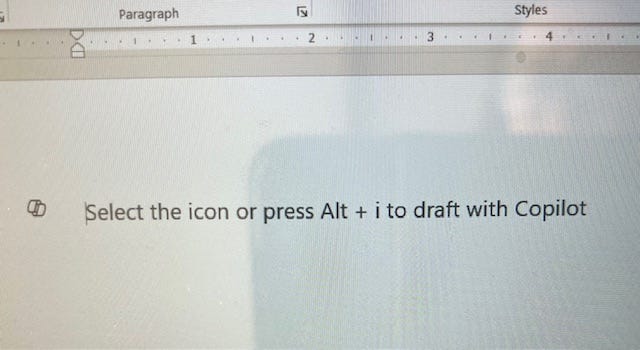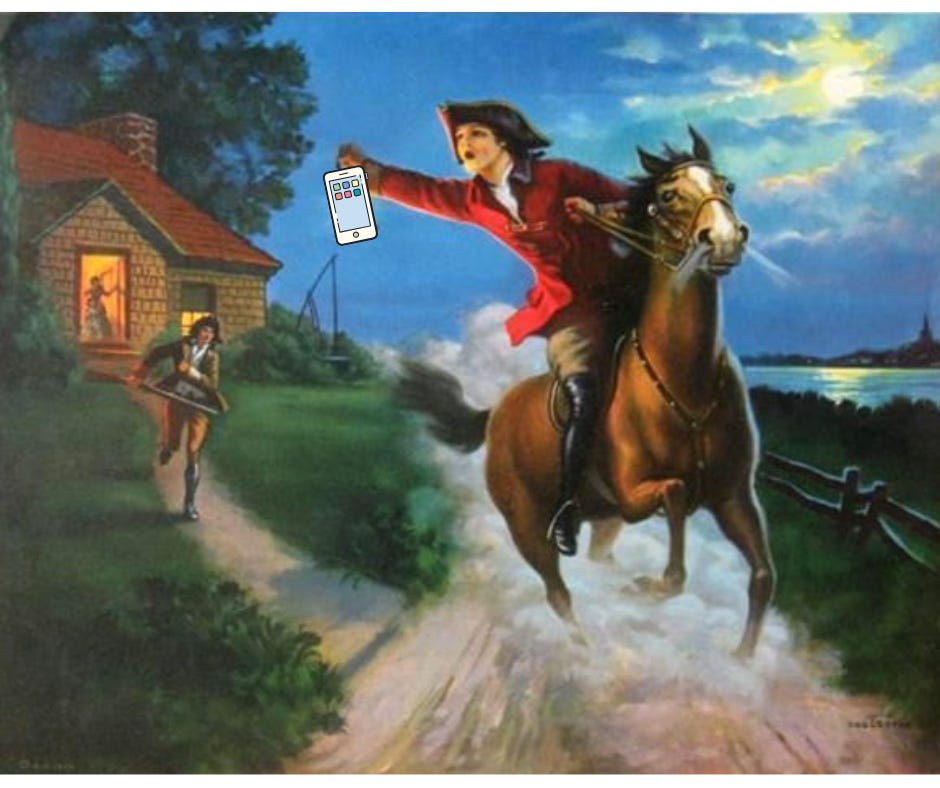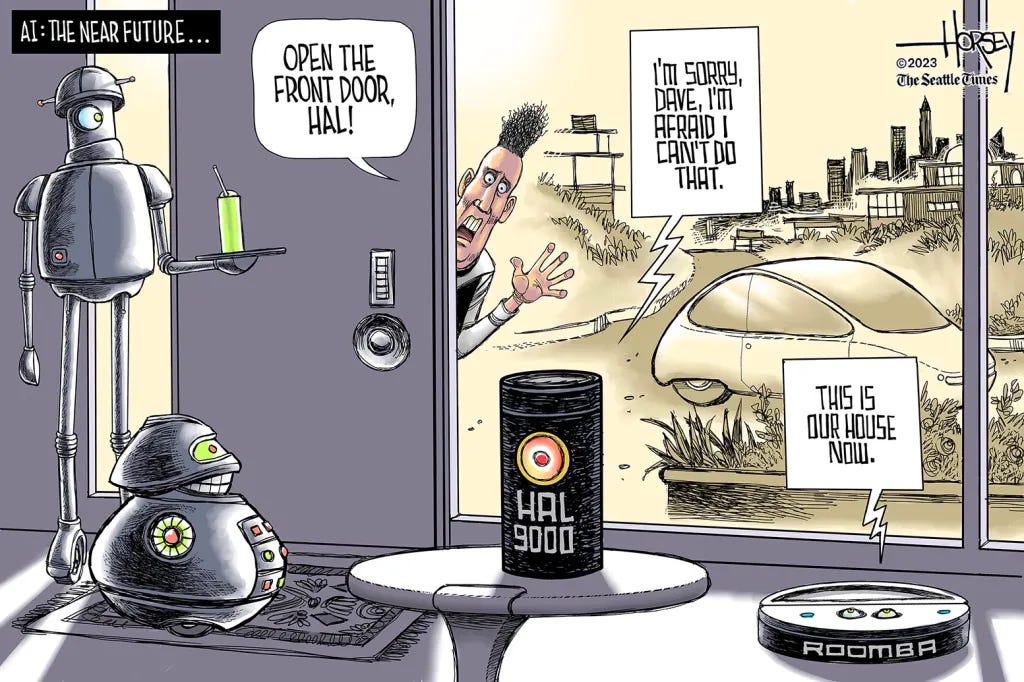This Was Not Written by A.I.
(Or was it...?)
Like most bad relationships, this one snuck up on me. A little flirting, a little naiveté, a whole lot of hidden agendas, and before you know it, bam. You’re in the ditch. In my defense, the whole thing did sound pretty harmless at the start: “artificial intelligence.” Kind of like “faux fur” or “costume jewelry.” What’s not to love? And just like that, I went from watching IBM’s Deep Blue computer play chess—How fun! How cute!—to dodging cyberattacks, deepfakes, and spyware in the blink of a 21st-century eye.
Admittedly, I’m not the best person to be keeping tabs on these things. In a world full of techie “early adopters,” I’m a late adopter. Like, showing up to the orphanage when the kid is already 17-and-a-half kind of late. It won’t surprise you to learn that I’m old enough to remember cranking down car windows, cranking wall-mounted pencil sharpeners, and cranking loose tape back into cassettes. (Lots of cranking, back in the day.) All that’s in the past, of course, and I eventually adapted to new technologies as the need arose. But I was happy to brag that I’d at least managed to avoid the scourge of A.I. interference in my daily life.
That is, until this morning, when I opened a new document in Word and found myself confronted by a jarring and perplexing sentence: “Select the icon or press Alt + I to draft with Copilot.” The message was accompanied by a weird little symbol that looked like two old Band-Aids floating on the surface of pond scum.
What the hell was this?
Though I’d never heard of “Copilot,” it wasn’t hard to figure out what was happening: This must be one of those A.I. writing “assistants” I’d heard so much about, inserting itself, uninvited, onto my page.
I deleted the sentence, but the stubborn icon remained. After much Googling and a frantic conversation with my early-adopter son, I managed to disable the cyber-intruder. (FYI, the solution is “File, Options, Copilot, Disable Copilot,” in that order. In case you’re wondering.) After about ten minutes, I was once again in control of my document.
So why did I still feel so violated?
It takes effort and imagination to create something new. And that effort and imagination is the point, isn’t it? Not the finished product, but the surprising, glorious process of creating it? That’s what we should be teaching our children and grandchildren: to stretch their inventiveness. To try, and fail, and try again. To dig into their depths and pull out talents and strengths that they never even knew were there.
Instead, we’re giving our kids A.I. “assistants.” We’re saying, “Hey, it’s okay to avoid the hard things. You’d probably be no good at it anyway, so why not just cheat? It might be tough to draft that letter to your boss, or create a character for your role-playing game, or write that term paper, or solve the problem, or think a distinctive thought. So here. Here’s a workaround.”
Forget survival of the fittest: This is survival of the quitters. The plagiarists. The ill-prepared, incurious loafers. Worse, we’re applauding it every step of the way. Each day, another corporation announces its A.I. “innovations” to fanfare and celebration. They’re stealing copyrighted works. They’re pitting groups against groups, wiping out jobs, dumbing down our discourse, and handing out cheat codes for the game of life, all to benefit the bottom lines of companies that are already wildly profitable.
And we’re just going to…let them? Where’s the outrage? Where’s the good ol’ can-do, hands-on, when-the-going-gets-tough-the-tough-get-going American spirit? I have a hard time picturing Patrick Henry shouting: “Give me liberty or give me death! Unless liberty is hard! Then let’s just forget about it! Tyranny is fine!” Or Paul Revere checking his GPS to figure out which way to ride. If they’d had to rely on phone batteries back then, we’d all be playing football with our feet today.
The sad truth is, I’ve been kidding myself with my smug repudiation of all things A.I. in my life. After all, when was the last time I contacted a customer-service department and “spoke” to anyone other than a ChatBot? How many of my daily activities are dictated by apps on my phone, from making appointments to checking the weather, feeding parking meters, clipping coupons, and figuring out how to get from here to there? Could I even get through a day without my pocket-sized wizard? Do I even want to find out? To quote the illustrious HAL 9000: “I’m sorry, Dave. I’m afraid I can’t do that.”
Even music, that most ancient and instinctual thing, now arrives to my ears in the form of playlists generated by an algorithm. And let’s not forget the elephant in this very big, very cybernetic room: basic human interaction, or the lack thereof. Why is in-person conversation suddenly harder to come by than a phone booth? The so-called “epidemic of loneliness” is easy to understand when we admit that we don’t have social lives so much as social-media lives, all of it controlled by unseen hands.
I hope like hell that we haven’t already lost. That we can still turn this thing around, reach out to each other—really reach out to each other, like with hands, not just DMs—and recapture the fellowship, dignity, and ingenuity that allowed to us to create all this A.I. in the first place.
That hope was renewed, however slightly, by that frantic conversation with my son as he helped me disable the Copilot interface. Once the A.I. writing “assistant” had been wiped away, I was surprised to hear him breathe a sigh of relief as loud as my own. “Good,” he said. “I hate that shit.”
I suppose I should have told him to watch his language. Choose a different word, perhaps. But considering that he had just joined me in the valiant battle to regain control of my own words from an authoritarian technological overlord, I figured I’d just let that one slide.
T.M. Blanchet is the author Herrick’s End, Herrick’s Lie, and Herrick’s Key (The Neath Trilogy), the producer of A Mighty Blaze Podcast, and the founder of Operation Delta Dog: Service Dogs for Veterans (OperationDeltaDog.org).







Love this. Bitingly funny and terrifyingly true. Highly quotable! And thank you for teaching me how to disable copilot. I've just been ignoring it and hoping it would take the hint and leave on its own. No such luck.
I love this piece. My feeling is that copilot and Gemini are introductory applications of an already fully developed consciousness model that exists and that will be made accessible to humanity. I gotta start with that even though it makes me sound cray cray, oh well. I don’t think AI is a human creation. I think it is off-planet in origin. It’s a weapon; it’s a tool; it’s a gift.
The way I see it, we got two choices. Become redundant or acknowledge what is valuable, precious and irreplaceable about ourselves… and what’s not. We want human exchange, well first be able to identify it. Then gravitate there.
I personally do treasure human artistic expression and I love nature. On the other hand there are a lot of things humans are addicted to that are not at all good for ourselves or the rest of life. I have a feeling AI won’t struggle to clarify this for us.
The words I hear people saying tend to be a variation of, “are we going to let them?” According to me our decisions are driving. It’s a subtle difference and you might be confused by my fatalistic statement paired with the occupy your own seat message. What I mean is the weapon-tool-gift is here and there’s no stopping it from developing into what it already is. The question we need to be asking ourselves is what am I interested in? Because it will be that.
There’s a great book I can recommend called Mentoring the Machines. https://a.co/d/3hnYGdL the basic premise is that we will have the opportunity to mentor AI. A period where AI is asking us questions. This has informed my thinking and why I think we want to be maturing into our roles rather than simply rejecting or consuming AI. I know… it’s a lot.